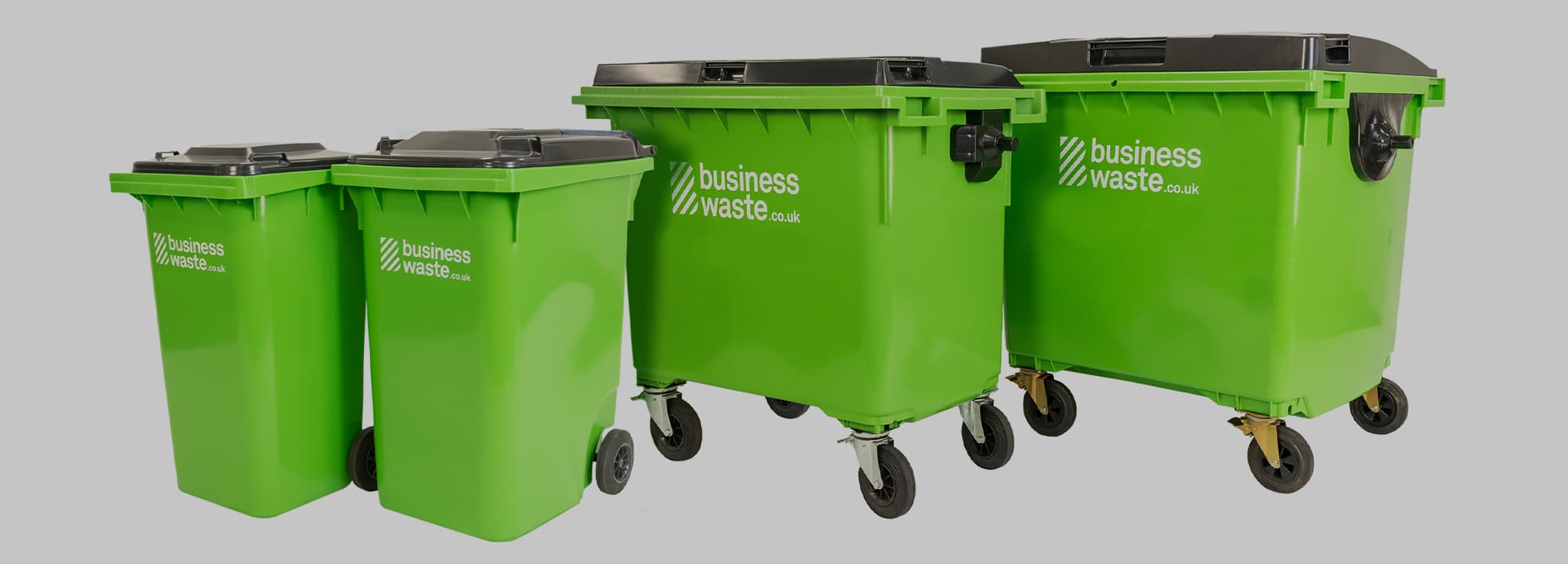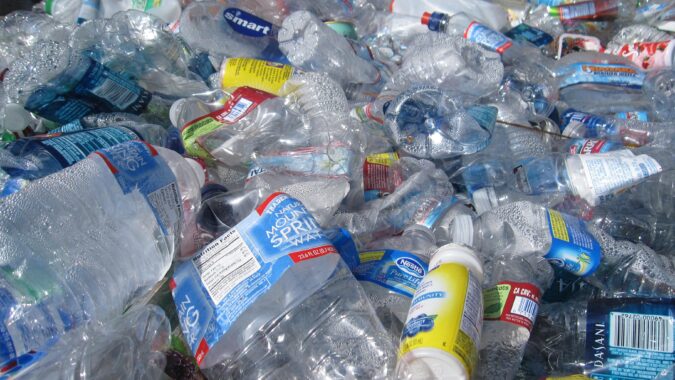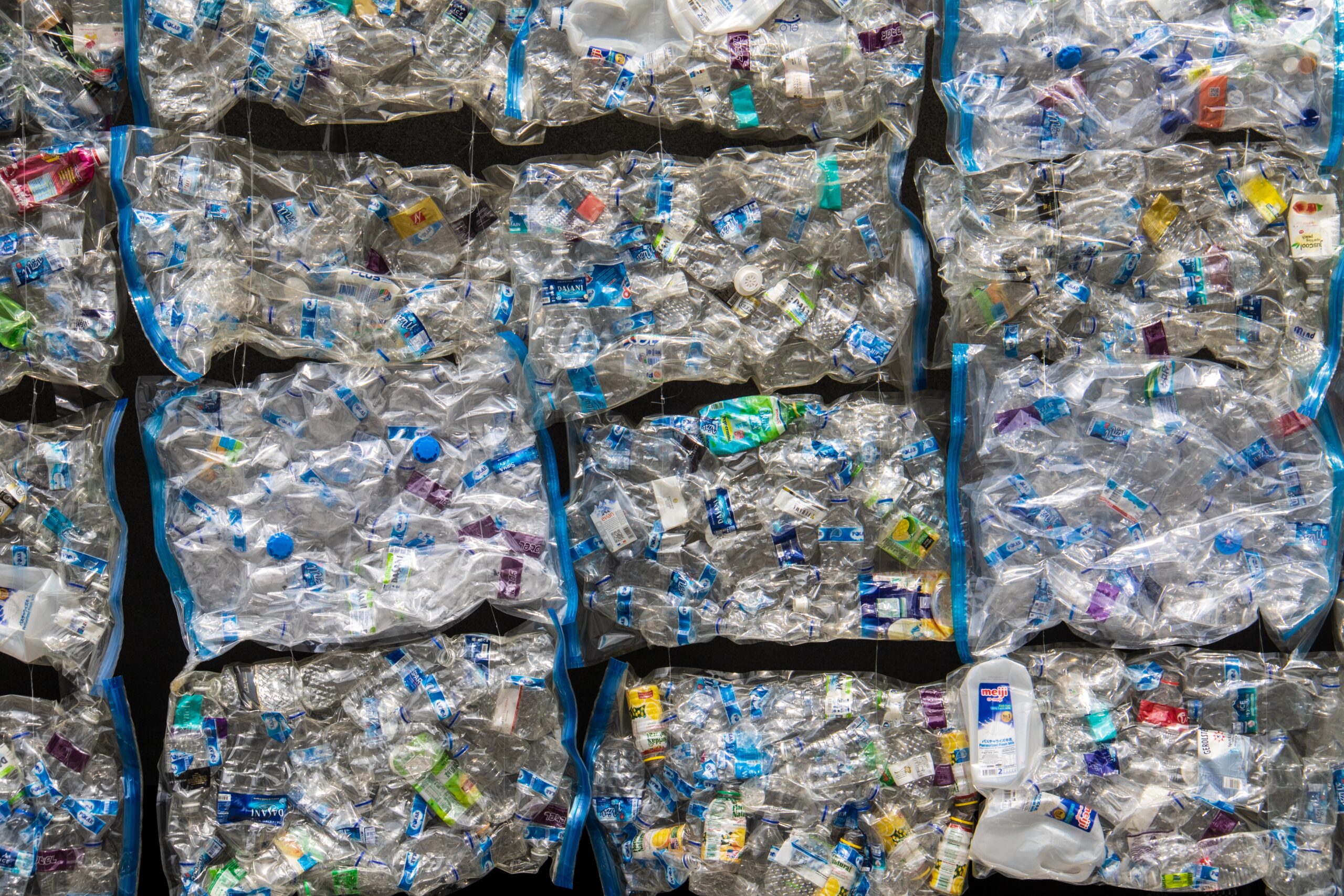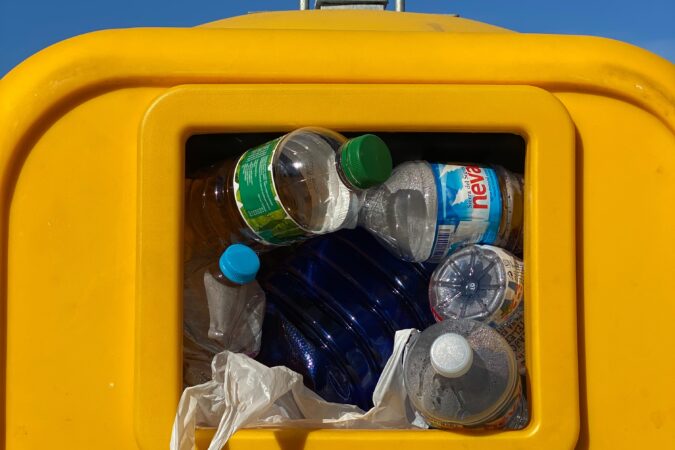
PET Recycling
Polyethylene terephthalate (PET or PETE) recycling is essential, as the material is 100% recyclable and one of the most used plastic packaging types in the world. 70% of all soft drinks come in PET plastic bottles and it’s used for other packaging. Businesses regularly produce PET plastic waste that needs recycling to protect the environment.
Despite the fact PET plastic is completely recyclable, the UK Household Plastics Collection Survey found only 60% of PET plastic bottles are recycled. This is a big improvement of just 3% in 2001, but there’s still lots of work to do. And businesses can lead the way by recycling all PET plastic waste produced.
Learn all about PET recycling on this page or call 0800 211 8390 or contact us online today for a free quote for plastic waste collection.
Get a fast quote
Get a fast FREE quote for PET recycling
- Free quote within 1 hr
- Any type of PET plastic
- FREE bins and delivery
- We cover all of the UK
What is PET plastic?
Polyethylene terephthalate – commonly referred to as PET or PET plastic – is clear, strong, and lightweight plastic. It’s a thermoplastic polymer resin that doesn’t contain polyethylene. PET is incredibly versatile and 100% recyclable, commonly melted down and recycled into its original use. It’s why you see many plastic drink bottles made from recycled plastics.
PET plastic has the recycling code 1. This strong inert material is often used for drinks bottles and food containers as it doesn’t react with foods. The material is resistant to attacks by microorganisms (like germs and fungi), and it won’t biodegrade when exposed to excess moisture and air for a long time.
PET plastic is used to make many products, such as:
- Plastic drinks bottles
- Mouthwash bottles
- Food containers
- Sleeping bags
- Carpet and clothing fibres
Is PET plastic recyclable?
PET plastic is recyclable. PET plastic can be recycled over and over again, it is not a single-use plastic. When recycling PET it will be separated from any contaminants and all other plastic types. Recycled PET is used to create new bottles, carpets, clothing, car parts, and some construction materials.
PET has the plastic code number 1. It’s one of the most used and recycled plastics, so the majority of local authorities accept PET plastic waste in their domestic recycling bins. Check with your local council or authority first, as some may not, and you’ll have to visit your nearby household waste recycling centre (HWRC).
Businesses must arrange commercial waste collection of any waste PET plastic – from bottles to containers – which can be done through our plastic recycling services.

How is PET plastic recycled?
There are two main methods of PET recycling – mechanical and chemical. The exact method depends on the recycling centre, its machinery, and its processes. Whichever way PET is recycled it will first be sorted and separated from other materials and plastic types either automatically or by hand. Then PET plastic is recycled in one of these ways:
- Mechanical PET recycling – often the PET plastic will be separated by colour and shredded into flakes. These flakes are washed to remove any remaining contaminants (such as labels, glue, and lids). Heat is applied and the virgin polymer is mixed in, and the melt is transformed into PET pellets. These pellets are then turned into preforms and sent to manufacturers who heat and form them into new PET products, such as bottles. Sometimes before the pellets are formed the PET fibres will be spun into recycled polyester yarn and used to form fabrics used in seatbelts, bags, carpets, and clothing.
- Chemical PET recycling – chemical agents are used to depolymerise PET plastic and avoid the release of toxic substances. There are three types of chemical PET recycling, with the best method based on the quality of the material and desired product:
- Glycolysis – the condensation reaction reverses by dissolving PET plastic in ethylene glycol.
- Methanolysis – the polymer is treated with large amounts of methanol with a catalyst present at high pressure and temperatures between 180 and 280ºC.
- Hydrolysis – this is the reverse of polycondensation, the reaction used to form PET plastic. A water and acid treatment hydrolyses the PET to produce terephthalic acid and ethylene glycol. These are then purified before reuse.
Why is PET recycling important?
PET recycling is important because it’s one of the most used plastic types in the world and is 100% recyclable. Recycling PET plastic ensures as much as possible is reused. It reduces the energy and materials required to create new plastic for a much more sustainable option.
Currently, only 60% of PET plastic bottles are recycled, so there’s clear room for improvement. Businesses can lead the way by ensuring all PET products are stored in plastic waste bins and collected by licensed waste carriers who transport them for recycling rather than sending them to landfill or incineration with general waste.
Recycling PET bottles and other products avoids plastic from ending up in landfill, where the chemicals contained in PET plastic may leach, contaminating the local ground, water, and air. PET plastic can take around 450 years to break down and decompose, so it takes up valuable landfill space.
PET 1 plastic recycling also saves your business money on disposal costs by lowering how much landfill tax you pay. Using recycled PET products helps companies save money too, by helping them abide by the UK government’s plastic packaging tax.
How to dispose of PET plastic
To dispose of PET plastic as a business, you must arrange commercial waste collection by licensed waste carriers. An easy way to do this is with Business Waste. We provide free bins to store any type of plastic waste together, and then licensed waste carriers remove them and take them to a recycling centre. To dispose of PET plastic responsibly:
- Get a free no obligation quote for plastic waste collection. Tell us where you’re located in the UK, the number and size of bins you need (or the amount of plastic waste you produce), and how often you want the bins collected.
- We’ll deliver free plastic bins to your business. Fill each one with your plastic waste (it can be just PET plastic waste or a combination of different types of waste plastic). Ensure all bins are filled within any max weight or fill lines.
- Move the plastic bins to the agreed collection spot ahead of pickup time. Our licensed waste carriers will remove them and replace them with any new bins requested – you only pay for the collection.
- The plastic waste is moved to a nearby waste management facility. PET plastic will be separated from other waste and plastic types, and then sent to an appropriate facility for mechanical or chemical recycling.
- You’ll get a free duty of care certificate that confirms your waste PET plastic was removed and disposed of legally, safely, and in an environmentally friendly manner.
Disposing of PET plastic at home is normally quick and easy. Check if your local authority accepts PET 1 plastic in your domestic recycling bins – most councils and authorities do. Clean and dry your waste PET products to remove contaminants and then place them in your household recycling bin.
If you have large volumes of PET plastic waste, consider taking it to your local HWRC or contact Business Waste for a free quote for collection.
Who needs to recycle PET plastic?
Most businesses produce some kind and amount of PET plastic waste during their daily operations. It could be empty drinks bottles thrown away in the office kitchen bin or packaging materials in a warehouse. PET 1 recycling is vital to protect the environment and save your organisation money on waste disposal costs.
Some key industries that should be recycling PET plastic include:
- Retailers – empty and waste plastic drinks bottles and packaging materials
- Restaurants – used plastic bottles for soft drinks and ingredients (like olive oil)
- Offices – plastic drinks bottles and food wrappers thrown away by staff
- Airports – food packaging and drinks bottles purchased and discarded at airports

Arrange PET plastic waste collection
Organise regular collections or a one-off removal of PET and other plastic waste from your business anywhere in the UK. Let us know the type and size of bins you need (or an idea of how much plastic waste you produce), where you’re based, and how often you want collections for a free no obligation quote.
We’ll deliver free bins to store your waste PET – two or four-wheel bins from 120 to 1100 litres – you just cover collection costs. Daily, weekly, and fortnightly collections are available. Licensed waste carriers remove all plastic waste, and we ensure all PET plastic is recycled so nothing goes to landfill.
Get a free quote today – call 0800 211 8390 or contact us online. One of our friendly and expert team can answer any questions and advise on your collection needs if required.
PET recycling FAQs
-
How is PET plastic made?
PET plastic is made by the polycondensation of ethylene glycol and terephthalic acid. These are combined to form pellets. The pellets of PET plastic are then polymerised and put through the relevant manufacturing process to create plastic bottles and other products
-
Why is PET plastic used for drinks bottles?
PET plastic is used to make drinks bottles as it’s strong, lightweight, and shatter-resistant – making it safer than glass. It’s transparent with the option of adding colours, which makes it ideal for packaging different drinks. Global health authorities recognise PET plastic as safe to contain food and beverages.
PET plastic is incredibly versatile and has great thermostability. As it’s lightweight this means more plastic bottles can be transported at once together (either full or empty), reducing transport costs. Plus, PET is 100% recyclable.
-
When was PET plastic invented?
PET was invented in 1941 by John Rex Whinfield, James Tennant Dickson, and the Calico Printers’ Association in Manchester. This was the year PET was patented. However, a patent for PET plastic bottles wasn’t secured until 1973 by Nathaniel Wyeth, a Dupont engineer.
-
How long does it take for PET plastic to decompose?
It can take around 450 years for PET plastic to decompose and break down. This is mainly because bacteria can’t consume and break down the chemicals used to create PET products. Recycling PET plastic is therefore vital to prevent it from ending up in landfill and taking hundreds of years to decompose.
-
What temperature does PET plastic melt at?
PET plastic has a melting point of 245°c. This may seem high but it’s a lot lower than the melting points of glass and aluminium. It means less energy is required to melt PET plastic when recycling and turning it into new products, making it a sustainable alternative.
Get a fast and free quote
Get a fast FREE quote for plastic waste collection
- Free quote within 1 hr
- Any type of waste plastic
- FREE bins and delivery
- We cover all of the UK
